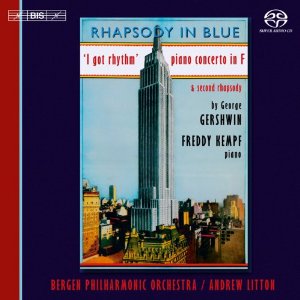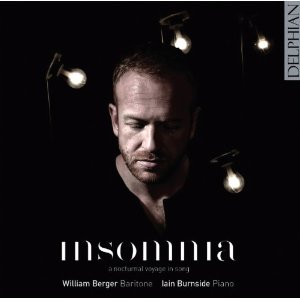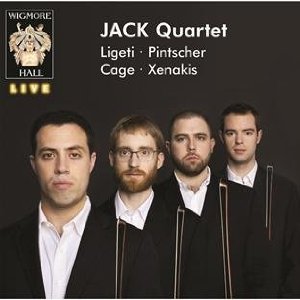Classical CDs Weekly: Gershwin, William Berger, JACK Quartet | reviews, news & interviews
Classical CDs Weekly: Gershwin, William Berger, JACK Quartet
Classical CDs Weekly: Gershwin, William Berger, JACK Quartet
Norwegian Gershwin, nocturnal lieder and fiendish modern string quartets


Programme your CD player to play this disc in reverse order, so that Gershwin’s cheeky, pithy Variations on "I Got Rhythm" opens proceedings. You sense Gershwin’s harmonic and rhythmic confidence soaring; this little piece never puts a foot wrong. Freddy Kempf’s performance is brimful of zip and zing, and so dazzling that your first instinct is to listen to it again. Kempf is even better in the similarly neglected Second Rhapsody, a 1931 work which the composer regarded as one of his greatest achievements. Gone is the patchwork structure of Rhapsody in Blue; the Second Rhapsody stands up as an expansive single movement concerto. The tunes are still there – a percussive, pounding opening intended to accompany film of construction workers pounding rivets into the steel frames of skyscrapers, and an indecently bluesy big theme at the heart. Andrew Litton provides a lustrous orchestral backdrop to both pieces, with brilliant percussion and a first clarinet with plenty chutzpah.
We get Rhapsody in Blue in the earlier, superior Ferde Grofé jazz-band version. This is a fun reading, but Kempf doesn’t sound quite as unbuttoned as in the later pieces. There’s plenty of technical brilliance – staggering rapid passage work and articulation, but the emotional thrills are provided by Litton’s Bergen forces, again dominated by cheeky winds and brass. And the same reticence affects the opening movement of the Concerto in F, as if Kempf feels slightly embarrassed and would rather be playing Beethoven sonatas. But stick with Kempf – it’s a thrill to hear him slowly drop his guard and deliver a slow movement of melting beauty followed by an Allegro agitato moving at a giddying, thrilling pace. BIS’s SACD sound is marvellous – you’ll hear details not heard elsewhere, and the orchestral playing is stunning.

What looks on paper to be an unlikely mixture of songs by composers as diverse as Wolf, Gounod, Debussy and Vaughan Williams makes complete sense in William Berger’s recital disc, with 17 songs reflecting a sleepless night endured by a man lamenting his lost love. So at 7.30pm we’ve Mozart’s Abenempfindung, the sequence ending, perhaps inevitably, at 6.00am with Strauss’s Morgen. The whole project gains extra poignancy from knowing that the cycle’s narrative was, in Berger’s words on theartsdesk, “the necessary, cathartic expression of my own grief for the end of a relationship.” You don’t, of course, need to know this. You’ll be beguiled by Berger’s voice and entranced by the more left-field musical choices. Three songs by English composers are pure gold in the hands of Berger and pianist Iain Burnside: Warlock’s The Night a stunner, as are two rarely-heard songs by Vaughan Williams and Richard Rodney Bennett.
Earlier, Debussy’s early, naïve Nuit d’étoiles is sung with selfless delight and Fauré’s Claire de Lune and Mandoline soar over Burnside’s rippling accompaniment. Raymond Yiu’s recent Sonnet melts seamlessly into the mix, the backward glances enchanting rather than irritating. Songs by Wolf and Liszt dominate post-midnight, and after Morgen we get a couple of encores, including a tiny Gounod number sufficiently breezy to banish the introspective mood and leave one feeling invigorated, not depressed.
William Berger sings Liszt's 'Oh! Quand je dors'

Ligeti’s String Quartet no 2 has a five-movement layout, a reference to the quartets written by his compatriot Bartók. His quartets contain their spooky moments, but this Ligeti piece ratchets feelings of nervy uncertainty to terrifying levels; after 20 minutes you’re exhausted. Passages hovering on the very edge of audibility suddenly explode. The quartet medium feels as if it’s being ripped apart. At times it’s as if the four players are completely oblivious to each others' presence, before you’re startled by a sudden backward-glancing gesture or conventional-sounding chord. Ligeti’s final Allegro con delicatezza begins in a mood of hushed expectancy, as if we’re going to get the resolution we’re desperately craving. The moment doesn't arrive – the piece dies away, imperceptibly. It’s terrific, and the JACK Quartet’s performance is jaw-dropping. Matthias Pintscher’s Study IV for Treatise on the Veil takes inspiration from a Cy Twombly painting; the player’s instruments prepared in Cageian fashion by having paperclips attached to the lowest strings. Head-scratchingly puzzling, but engaging.
With John Cage’s String Quartet in Four Parts we’re in another world; Cage’s vibrato-free melodies and widely spaced lines a shock to the system. The third section, Nearly Stationary, outstays its welcome, but the closing Quodlibet is a charmer. The thorniest morcel is saved for the dessert course; Iannis Xenakis’s 1983 Tetras. Thrilling stuff – loud, abrasive, and full of sounds which you’d struggle to identify as coming from stringed instruments. Here, the sonic shocks never sound like anything less than music – you can’t imagine the work ever blasting out with such force and swagger. Immaculate performances, captured on the wing in detailed, close up sound.
Watch the JACK Quartet play an extract from Tetras
Explore topics
Share this article
The future of Arts Journalism
You can stop theartsdesk.com closing!
We urgently need financing to survive. Our fundraising drive has thus far raised £49,000 but we need to reach £100,000 or we will be forced to close. Please contribute here: https://gofund.me/c3f6033d
And if you can forward this information to anyone who might assist, we’d be grateful.

Subscribe to theartsdesk.com
Thank you for continuing to read our work on theartsdesk.com. For unlimited access to every article in its entirety, including our archive of more than 15,000 pieces, we're asking for £5 per month or £40 per year. We feel it's a very good deal, and hope you do too.
To take a subscription now simply click here.
And if you're looking for that extra gift for a friend or family member, why not treat them to a theartsdesk.com gift subscription?
more Classical music
 From Historical to Hip-Hop, Classically Black Music Festival, Kings Place review - a cluster of impressive stars for the future
From quasi-Mozartian elegance to the gritty humour of a kitchen inspection
From Historical to Hip-Hop, Classically Black Music Festival, Kings Place review - a cluster of impressive stars for the future
From quasi-Mozartian elegance to the gritty humour of a kitchen inspection
 Shibe, LSO, Adès, Barbican review - gaudy and glorious new music alongside serene Sibelius
Adès’s passion makes persuasive case for the music he loves, both new and old
Shibe, LSO, Adès, Barbican review - gaudy and glorious new music alongside serene Sibelius
Adès’s passion makes persuasive case for the music he loves, both new and old
 Anja Mittermüller, Richard Fu, Wigmore Hall review - a glorious hall debut
The Austrian mezzo shines - at the age of 22
Anja Mittermüller, Richard Fu, Wigmore Hall review - a glorious hall debut
The Austrian mezzo shines - at the age of 22
 First Person: clarinettist Oliver Pashley on the new horizons of The Hermes Experiment's latest album
Compositions by members of this unusual quartet feature for the first time
First Person: clarinettist Oliver Pashley on the new horizons of The Hermes Experiment's latest album
Compositions by members of this unusual quartet feature for the first time
 Gesualdo Passione, Les Arts Florissants, Amala Dior Company, Barbican review - inspired collaboration excavates the music's humanity
At times it was like watching an anarchic religious procession
Gesualdo Passione, Les Arts Florissants, Amala Dior Company, Barbican review - inspired collaboration excavates the music's humanity
At times it was like watching an anarchic religious procession
 Classical CDs: Camels, concrete and cabaret
An influential American composer's 90th birthday box, plus British piano concertos and a father-and-son duo
Classical CDs: Camels, concrete and cabaret
An influential American composer's 90th birthday box, plus British piano concertos and a father-and-son duo
 Cockerham, Manchester Camerata, Sheen, Martin Harris Centre, Manchester review - re-enacting the dawn of modernism
Two UK premieres added to three miniatures from a seminal event of January 1914
Cockerham, Manchester Camerata, Sheen, Martin Harris Centre, Manchester review - re-enacting the dawn of modernism
Two UK premieres added to three miniatures from a seminal event of January 1914
 Kempf, Brno Philharmonic, Davies, Bridgewater Hall, Manchester review - European tradition meets American jazz
Bouncing Czechs enjoy their Gershwin and Brubeck alongside Janáček and Dvořák
Kempf, Brno Philharmonic, Davies, Bridgewater Hall, Manchester review - European tradition meets American jazz
Bouncing Czechs enjoy their Gershwin and Brubeck alongside Janáček and Dvořák
 Solomon, OAE, Butt, QEH review - daft Biblical whitewashing with great choruses
Even a top soprano and mezzo can’t make this Handel paean wholly convincing
Solomon, OAE, Butt, QEH review - daft Biblical whitewashing with great choruses
Even a top soprano and mezzo can’t make this Handel paean wholly convincing
 Two-Piano Gala, Kings Place review - shining constellations
London Piano Festival curators and illustrious friends entertain and enlighten
Two-Piano Gala, Kings Place review - shining constellations
London Piano Festival curators and illustrious friends entertain and enlighten
 Echo Vocal Ensemble, Latto, Union Chapel review - eclectic choral programme garlanded with dance
Beautiful singing at the heart of an imaginative and stylistically varied concert
Echo Vocal Ensemble, Latto, Union Chapel review - eclectic choral programme garlanded with dance
Beautiful singing at the heart of an imaginative and stylistically varied concert
 Scott, Irish Baroque Orchestra, Whelan, RIAM, Dublin review - towards a Mozart masterpiece
Characteristic joy and enlightenment from this team, but a valveless horn brings problems
Scott, Irish Baroque Orchestra, Whelan, RIAM, Dublin review - towards a Mozart masterpiece
Characteristic joy and enlightenment from this team, but a valveless horn brings problems

Add comment